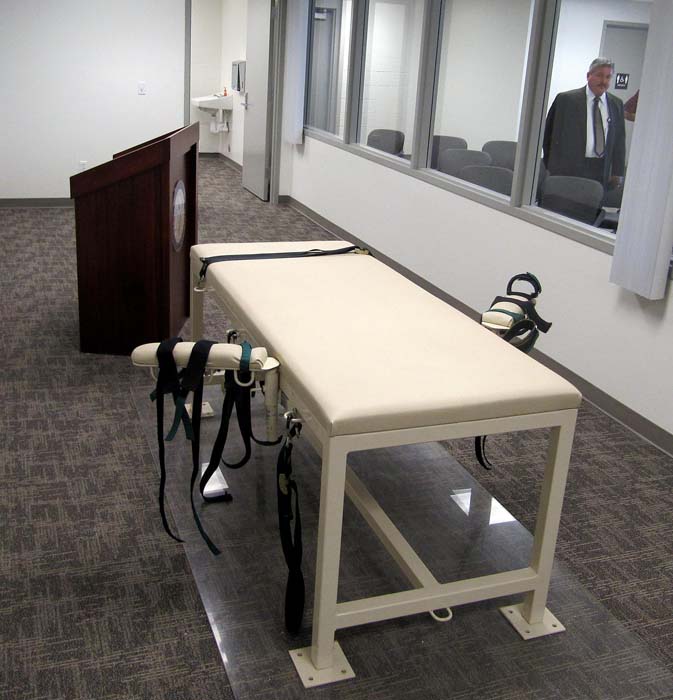News of the weird: Idaho ordered to execute inmate but state lacks lethal drugs
Published 10:29 am Sunday, February 26, 2023

- The execution chamber at the Idaho Maximum Security Institution is shown as Security Institution Warden Randy Blades look on in Boise, Idaho on Oct. 20, 2011. Idaho's attorney general has obtained a court order that requires a terminally ill death row inmate be executed within 30 days, even though the state has no way to carry out the death sentence.
BOISE, Idaho — Idaho’s attorney general has obtained a court order that requires a terminally ill death row inmate to be executed within 30 days, even though the state has no way to carry out the death sentence.
Trending
Idaho Department of Correction officials have not been able to obtain the chemicals used in lethal injection executions for several months, and two previous death warrants issued for Gerald Ross Pizzuto Jr. have already gone unfulfilled. Pizzuto has spent more than three decades on death row for his role in the 1985 slayings of two gold prospectors.
Normally a death warrant also triggers a flurry of preparations by prison officials, but Idaho Department of Correction Director Josh Tewalt said he was putting many of those procedures on hold while the department continues its “efforts to lawfully source chemicals.”
Idaho Attorney General Raul Labrador announced the order Friday, Feb. 24, just two days after a legislative panel introduced a bill that would bring back firing squads as a method of execution. That never-used option was stricken from state law in 2009, but the bill sponsored by Republican Rep. Bruce Skaug would allow it when lethal injection isn’t available.
Trending
Labrador said his office is required to obtain a new death warrant while the state works to get the necessary drugs.
“Idaho law is clear, those who commit the most egregious crimes deserve the ultimate punishment,” he said in a statement. “We followed the law and obtained a new death warrant.”
The attorney general acknowledged that each new court proceeding increases stress on the victims’ family members and said he hoped lawmakers would consider allowing an alternative method of execution.
Pizzuto’s attorneys questioned the timing and said getting a new death warrant now does not make sense.
“It also demonstrates a clear lack of professionalism and a cruel disregard for the emotional torment it causes Mr. Pizzuto, as well as the stress and anxiety it creates for everyone else involved,” Deborah A. Czuba, the supervising attorney of the Federal Defenders of Idaho’s capital habeas unit, said in a statement.
“We find the timing of the warrant particularly curious, given that it was sought by Attorney General Labrador while he advocates for a new law that would bring back the firing squad,” Czuba added.
Czuba also suggested the issue could be avoided if Idaho Gov. Brad Little would reconsider his decision to deny Pizzuto clemency despite a parole board’s recommendation that his sentence be commuted to life without parole.
In its recommendation, the board cited Pizzuto’s terminal bladder cancer and other health problems as well as the torture and abuse he endured as a child. But Little said the brutal nature of the killings merited the death sentence.
St. Louis Zoo bear has second brief escape from enclosure
ST. LOUIS — St. Louis Zoo officials say they are working to find a way to keep an Andean bear named Ben inside his enclosure after he escaped Thursday, Feb. 23, for the second time this month.
The bear was outside for less than an hour and was found only about 100 feet away from his habitat, zoo officials said in a statement. The 4-year-old bear, who weighs about 300 pounds, was tranquilized and returned to the enclosure.
Visitors and zoo staff were kept inside zoo buildings during Ben’s escapade.
The bear escaped on Feb. 7 by tearing apart clips that attached stainless steel mesh to the frame of the enclosure’s door. He did not wander far and was outside for about 90 minutes before being returned.
In response, the zoo added stainless steel clips with 450 pounds of tensile strength to the mesh. But Ben managed to snap those clips Thursday.
Zoo officials said they are working on alternative ways to secure the enclosure and will seek advice from the Association of Zoos & Aquariums Bear Taxon Advisory Group.
University to raze house where Idaho students were killed
MOSCOW, Idaho — The house where four University of Idaho students were stabbed to death in November will be demolished, school officials said Friday, Feb. 24.
The owner of the home in Moscow offered to give it to the university and the school accepted, University President Scott Green said in a memo to students and employees.
“This is a healing step and removes the physical structure where the crime that shook our community was committed,” Green wrote.
No timeline has been set for the demolition, but university spokesperson Jodi Walker told the Idaho Statesman that the goal is to have the house knocked down by the end of the semester.
“We’re just working through the processes that it takes to do such a thing,” Walker said. “But from the university standpoint, and in talking with the families, the sooner, the better.”
Walker also said the university is working with students and other community members to create a plan for the property’s future development that would honor the slain students: seniors Madison Mogen and Kaylee Goncalves, both 21, junior Xana Kernodle, 20, and freshman Ethan Chapin, 20.
The victims’ bodies were found on Nov. 13 at the rental home, which is across the street from the university campus.
Bryan Kohberger, a former graduate student of Washington State University in neighboring Pullman, Washington, is charged with four counts of first-degree murder and burglary in connection with the killings.
Green also announced Friday that planning has started on a memorial for the four students. The memorial will be the focus of a garden in a location to be determined on campus grounds.
Scholarships in honor of the students are also being established.









